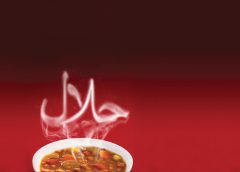
Ehsan Sairally
In view of changing worldwide demographics there is a comparable global shift in market needs. In the food sector we can see traditional Halal markets expanding to include main stream non-Halal consumer markets. This is driven not only by growth in traditional Halal markets but also by expanding non-Halal consumer markets. While these distinct markets have different consumer perspectives they also have similar needs and preferences that come together at point-of-purchase. Both groups care about quality of food and food ingredients and where food comes from. Both groups care about how food is made and how it is handled throughout the supply
chain from farm to table. Halal foods fit today’s market situation because they have been made with care and attention to quality for thousands of years.
The following is the original quality for accessing and consuming Halal which is an integral part of the Islamic faith: “O mankind eat from whatever is on earth that is lawful and pure.” (The Qur’an, 2:168)
Main stream production of Halal foods now satisfy the quality care and needs of both Halal and non-Halal consumers. The perspectives and needs of both markets are readily addressed and it’s a win-win situation for both groups. This demystifies the concept of Halal for a common understanding by both halal consumers and non-Halal consumers alike.
With technological advances and rapid progress in the field of communication, the halal world is vertically and horizontally connected on a broad scale period. It is a natural fit for main stream quality regulated commercial Halal food production.
Simply Halal is not just seasonal product concept. It is everyday quality care and lifestyle thinking for the betterment of oneself and humanity.
Expanded Halal horizons
Halal opportunity horizons can extend beyond food to include a range of products i.e. cosmetics, pharmaceuticals, personal care products, clothing, industrial chemicals and lubricants. Simply Halal is a win-win strategy for all stakeholders in the food chain (i.e. consumers, producers, marketers and retailers). Regardless of product category, halal certification labels boost confidence. The significant Halal growing market cannot be ignored at both domestic and international levels. A growing global demand for healthy food, Halal is a ripe atmosphere to capture a market share that has been left untapped for too long. Moreover, Halal is in compliance with high quality natural, organic and minimally processed foods made using quality certified ingredients.
Without any doubt, a simple Halal investment initiative will drive market expansion, and build future momentum across all Halal sectors.
Going forward, Halal food manufacturers and consumers can benefit from the following:
Ø Benchmark standards
Ø Value-added
Ø Quality, variety, choice selection, convenience
Ø Market resilience
Ø Competitive edge
Ø Year round market
Ø Minimum investment & minimum adjustment
Ø By 2025, 30% of global halal consumers
Ø Digitally connected
Ø Expanded market reach to Halal and non-Halal consumers
Ø Informed consumers
Ø Portability, convenience, simple halal certification label
A switch to Halal production involves minimum investment and minimum adjustment. It satisfies the common needs of two distinct markets with compatible perspectives; Halal and non- Halal.

